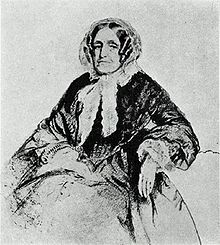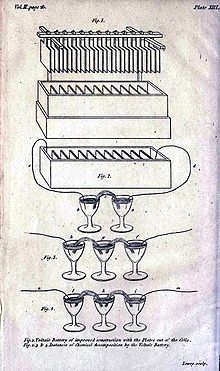- Jane Marcet
-
Jane Marcet (née Haldimand) (January 1, 1769 – June 28, 1858) was a successful writer of popular introductory science books.
Contents
Life
She was born in London, one of twelve children of the merchant and banker Anthony Francis Haldimand (1740/41–1817) and his wife Jane (died 1785), and was tutored at home with her brothers. Her brother William Haldimand became a director of the Bank of England and a member of Parliament. She took over the running of the family after her mother's death. She paid a visit to Italy with her father in 1796. After her marriage in 1799 to Alexander John Gaspard Marcet (1770–1822), a Swiss exile and physician, she continued to live in London where, through her husband, she had contact with many leading scientists. Of their four children, François Marcet (1803–1883) became a well-known physicist.[1] She died in the house of a daughter in Piccadilly, London in 1858.
"Conversations"
After helping to read the proofs of one of her husband's books, Marcet decided to write her own, and produced expository books on chemistry, botany, religion and economics under the general title "Conversations".
The first of these was eventually published as Conversations on Natural Philosophy in 1819, and established a common format in her works: a dialogue between two pupils, Caroline and Emily, and their teacher, Mrs Bryant. Her Conversations on Chemistry was published anonymously in 1805, and became her most popular and famous work. Summarizing and popularizing the work of Humphry Davy, whose lectures she attended, it was one of the first elementary science textbooks. It went 16 editions in England, where it was an early inspiration for the young Michael Faraday, and was widely plagiarized in America.[2]
Marcet also popularized the arguments of political economists like Adam Smith, Malthus, and above all David Ricardo, in her Conversations on Political Economy (1824). This was well received and widely read, although some later economists such as Alfred Marshall were dismissive, to the detriment of its later reputation, and Joseph Schumpeter derided it as "economics for schoolgirls".[3] The purpose, however, was an important one that went beyond the lucrative supply of a niche market. Mrs B's flippant pupil, Caroline, says that she would have thought a woman could be excused ignorance of that topic. Mrs B replies tartly, "When you plead in favour of ignorance, there is a strong presumption that you are in the wrong."[4]
In later life Marcet wrote mainly for children, perhaps with her grandchildren in mind. Mary's Grammar (1835) became a classic. Marcet was a friend of the novelist Maria Edgeworth, who described their home, with lively, intelligent children and a welcome for visitors. Marcet's Conversations on Political Economy were an inspiration to Harriet Martineau to introduce economic topics into her writings.[2]
Legacy
Marcet's works contained few original ideas and presented science and economics in an informal way, but her simple introductions to often complex subjects were widely appreciated, by adults as well as the children for whom they were intended, and most importantly by women, who were not encouraged to explore the experimental sciences at that time. She was uniquely qualified to play that role by her contacts with many of the greatest thinkers and scientists of her day.
When Henry James wrote The Turn of the Screw in 1898, Marcet was still a standard textbook. The governess refers off-handedly to a text:
-
- ". . . as impersonal as Mrs. Marcet or nine-times-nine."
References
- ^ Elizabeth J. Morse: Marcet, Jane Haldimand (1769–1858). In: Oxford Dictionary of National Biography, online e. (Oxford: Oxford University Press, September 2004). Retrieved 9 September 2010.
- ^ a b Elizabeth J. Morse, op. cit.
- ^ Quoted in Elizabeth J. Morse, op. cit.
- ^ [Jane Marcet]: Conversations on Political Economy ([London]: Longman, 1816), page 11. Quoted in Elizabeth J. Morse, op. cit.
Further reading
- Armstrong, Eva (February 1938). "Jane Marcet and her "Conversations on Chemistry". Journal of Chemical Education: 53–57.
- Crellin, John K. (July 1979). "Mrs. Marcet's "Conversations on Chemistry". Journal of Chemical Education: 459–460.
- Lindee, M. S. (1991). "The American career of Jane Marcet's Conversations on Chemistry, 1806 – 1853". Isis 82: 8–23. doi:10.1086/355635.
- Marcet, Jane (1817). Conversations on Chemistry. London: Longman. http://www.archive.org/details/conversationsonc01marcuoft.
- Martineau, Harriet (1869). Biographical Sketches. New York: Leypoldt and Holt. pp. 70–76. http://www.archive.org/details/biographicalsket00martuoft.
- Rosenfield, Louis (2001). "The Chemical Work of Alexander and Jane Marcet". Clinical Chemistry 47 (4): 784–792. PMID 11274044. http://www.clinchem.org/cgi/reprint/47/4/784.pdf.
- Rossotti, Hazel (June 2007). "The Woman That Inspired Faraday". Chemistry World: 58–61.
- Conversations on Chemistry by Jane Marcet 10th ed 1825
- Brief Biography - From the Library of Economics and Liberty
- Drawing of Jane Marcet and illustrations from her books (Edgar Fahs Smith Collection)
- "Jane Marcet's Books". John H. Lienhard. The Engines of Our Ingenuity. NPR. KUHF-FM Houston. 1992. No. 744. Transcript.
Categories:- 1759 births
- 1858 deaths
- People from Geneva
- English educators
- Writers from London
-
Wikimedia Foundation. 2010.


